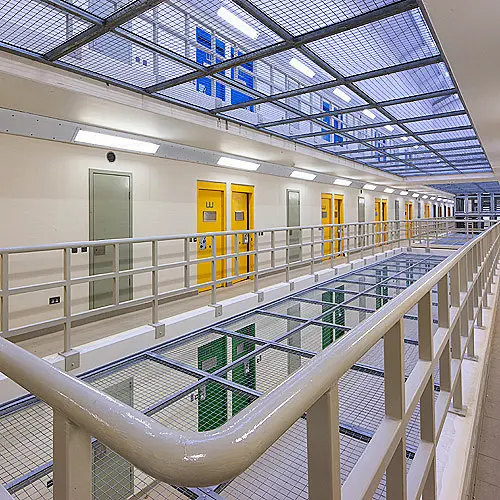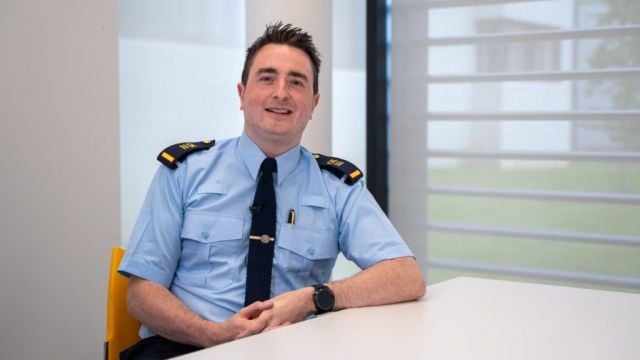“It’s like a little village, it’s a community within a community,” says John Duggan, an officer at Cork Prison.
John has worked for the prison service for the last nine years, and says “like everyone, I had a different perception of what life may have been like because prison is portrayed on television as this mad environment, but it’s nothing like that at all, it’s the complete polar opposite.
“It’s a place where people get a second chance."
As an integrated sentence management (ISM) officer, he manages the rehabilitation of prisoners when they arrive into custody.
“My role is really to make sure they are aware of why they are here, but also to give them the opportunities to help them develop, learn and upskill while in custody.
“We have people serving anything from a couple of months to life, so everyone here is serving their own sentence, but it is up to them what they want to gain from their sentence,” says the Cork man.
Advertisement
John is not only involved in the rehabilitation of prisoners, but also the day-to-day operations of the prison.
Starting his day at 8am, he heads to the landings "and we unlock for feeding for breakfast. . . the minute you get in that gate you are straight to work”.
The breakfast rush takes around 40 minutes, including the administration of medication by the nurses. The prisoners take their breakfast on a tray and bring it back to their cells.
“We have 260-odd prisoners here in Cork prison so that’s quite a lot of people and that takes time.
“We unlock again around 9 o’clock,” he says, for work and school.
“In Cork we have a strong emphasis on the work-training environment, so we have a lot of workshops,” says John.
These workshops and jobs include the laundry, kitchen, waste-management and horticulture.
“We have a lot of lads here starting their leaving cert, going all the way up to open university, so we have students of all levels, people who would have broken away from school or maybe never had an opportunity to go to school or had a bad relationship. They are given the opportunity here to up-skill,” he says.

New arrivals
Throughout the morning John will meet the new committals arriving in Cork prison.
“In the last couple of years the prison service has changed dramatically, there is a stronger emphasis now on rehabilitation.
“My primary role is to co-ordinate the delivery of services to the prisoners here in Cork prison. Every prisoner that comes into Cork prison I interview them and assess them.
“First of all, we try to challenge them on their offending behaviour. Obviously people are in for different sentences or different crimes that they have committed in the community. We try to look at the nuts and bolts of their crime, why are they offending? Are they repeat offenders? And what services do we have that could actually help them address their offending behaviour whilst in custody.”
A multidisciplinary approach is taken towards the rehabilitation of prisoners, and this team approach involves in-house probation officers, addiction councillors, resettlement officers, psychology and a healthcare team.
After 12pm the prisoners receive lunch, which they bring back to their cells, and the cells are locked again from 12.30pm until 2pm.
After lunch the prisoners go back to school or work, and return to their cells for a short period in the afternoon before being unlocked again after 5pm for recreational time.
“Most of them will go to the yard, or others depending on what landing they are on, you might have access to the library in the evenings or video calls.”
Visits in Cork prison take place on a Monday, Tuesday, Wednesday and Friday, however, John says most visits are now virtual since the pandemic.
The rehabilitation officer says the video visits have been “brilliant” because prisoners are speaking to their families more often as they don’t have to travel.
“Before some people wouldn’t have the opportunity for a physical visit, but now with the introduction of video visits, prisoners can stay in communication more frequent and maintain those family relationships.
“It gives the prisoners more opportunities to talk to their family members. Family relationships and those bonds are integral to the rehabilitation of prisoners.
“People in there, yes they have done wrong, but not everyone who comes to prisoner is necessarily a bad person and everyone has a different story.”
Different paths
“I had a different path to most who enter the prison service,” says the rehabilitation officer, who joined the service at the age of 23.
John started out working for the prison service in a clerical role as a prison administration support officer after finishing a university degree in Irish and History.
“I wanted a job that was different, provide a good financial income and a job that would afford me opportunities for career progression,” he says.
“I came pretty much directly from college . . . A lot of people are much older when they join, there are a lot of existing civil servants. A lot of people transfer from the army or the navy, or they come from a backgrounded security or social care.”
Now nine years into his career, John says his favourite aspect of his job is seeing prisoners progress, develop and change.
“You’re working with people who come from the most marginalised parts of society, probably weren’t awarded the same opportunities as others growing up and seeing them progress.
“There’s people who can’t read and write and then when they actually get a cert from maybe a third level college such as MTU, it’s like seeing them win the lotto.”







